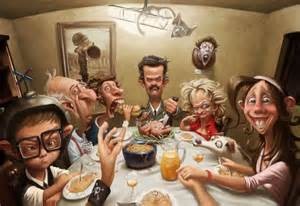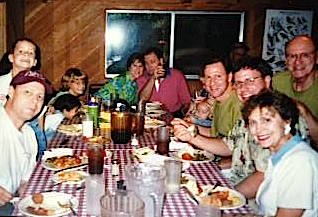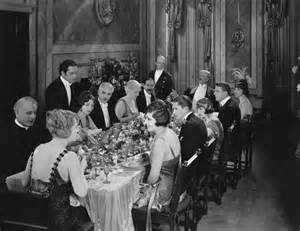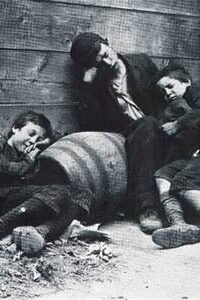Growing up in the Bud and Bernie Arnold household we practiced certain rules that helped stem the tide of chaos and kept certain rituals that over time grounded and centered us giving us a sense of our place in this world. One such regulation/ritual was the dinner hour. Regardless how the day went for the individuals in the family, sitting down to break bread together at six p.m. was a precedent we maintained at all cost, and within that auspicious span of time, our raw humanity was illuminated.
 It would be safe to say that over the years, thousands of people have sat at the Arnold table and each guest was honored by my parents if not always by their children. Missionaries, actors, teachers, journalists, writers, preachers, freeloaders, boarders, artists, strangers, students, politicians, all racial stripes, all gender stripes, rich, poor, ex-cons, addicts, alcoholics, the terminally ill, the greatest of these and the least of these (a guest list that would rival the Queen); if you were at the house at the dinner hour, invited or uninvited, a plate was set for you at the table and a bed was made if you needed a place to sleep.
It would be safe to say that over the years, thousands of people have sat at the Arnold table and each guest was honored by my parents if not always by their children. Missionaries, actors, teachers, journalists, writers, preachers, freeloaders, boarders, artists, strangers, students, politicians, all racial stripes, all gender stripes, rich, poor, ex-cons, addicts, alcoholics, the terminally ill, the greatest of these and the least of these (a guest list that would rival the Queen); if you were at the house at the dinner hour, invited or uninvited, a plate was set for you at the table and a bed was made if you needed a place to sleep.
There were guests who stayed for a few nights or a few weeks and sometimes to infinity and beyond. The weirdest guests I remember was a marginal friend of mine from my college days who brought his new bride to Nashville for their honeymoon and was too broke to afford a hotel so they stayed in my sister’s room upstairs. She was still away at school so no one had to be displaced from their rooms. The newlyweds were very quiet. My brothers and I could only imagine what was going on. The couple was invited to our evening meals, and my friend accepted a few times, but the bride never made an appearance. He took her meals up to their room. How romantic we thought, but no; the romance seemed to be missing like the bride herself for we never laid eyes on her after their initial arrival. They never went anywhere during their stay. On occasion, my friend would apologetically walk through the house offering as an explanation the need to fetch something for the bride. After several days of this absurdist drama, the couple slipped away while we all were conveniently absent, and within a few weeks, we got word that their marriage had been annulled. That explained the silence in the next room. As it has been said, you will never realize how peculiar your friends are until you start to describe them to someone else.
 To gather around the Arnold dinner table was always a mixture of the sacred and the profane. It was rarely a Rockwell painting. However, my parents, Dad in particular, did their best to elevate conversation and not stoop to the discourse and behavior of their offspring, especially in the presence of company. But sometimes they could not avoid being dragged down into the mire.
To gather around the Arnold dinner table was always a mixture of the sacred and the profane. It was rarely a Rockwell painting. However, my parents, Dad in particular, did their best to elevate conversation and not stoop to the discourse and behavior of their offspring, especially in the presence of company. But sometimes they could not avoid being dragged down into the mire.
On one such occasion my sister had invited a girlfriend from middle school over to spend the night. Her name was Sue, and Dad, in his southern-gentleman-from-Virginia, fashion (he was “to the manor born” if only in his mind), formally welcomed “Our friend Sue,” to our home and table before we all bowed in prayer to bless the meal. Sue was a first-timer and unaccustomed to the potential for boisterousness at an Arnold dinner table, so at the start we were on our best behavior. Guests were given the first choice of each dish, and Dad would insure that his children did not disrupt the protocol (like reaching across the table and spearing the choice baked potato off the dish with lightning speed), by saying things like, “Our friend Sue needs a baked potato,” or “Our friend Sue needs a refill of her tea,” or “Pass the salt and pepper to our friend Sue.”
Such decorum did not last long. There was no accounting for what might have prompted the rapid deterioration of our manners and conduct, but whatever it was, Bud and Bernie took swift action to stop the descent into madness. One of my brothers cupped his hand under his armpit, pumped his arm several times making crude sounds, and then wiped his hand on top of the other brother’s head. A juvenile riot ensued with groans and jabs until Dad interjected, “Boys, I am shocked at such behavior at the dinner table, and in front of our friend Sue. Both of you go to your rooms.”
There was no reconciliatory love expressed between my brothers as they left the table and stomped up the stairs to their room.
I was wearing a sleeveless undershirt, “dripping with attitude,” as my sister loves to remind me, and had inappropriately propped my elbows on the table. Some manners my parents chose to ignore in spite of their best efforts to impose Emily Post’s rules of etiquette. But that breach of table manners had a worse consequence than a parental reprimand for it exposed the vulnerability of my armpit. I made some derogatory comment to my sister, and as quick as the strike of a snake, she yanked the exposed underarm hair. I howled, and responded by giving her forearm a good Indian burn. When she yanked her arm away a glass of tea was knocked over.
“Both of you to your rooms now,” Mom exclaimed, and brother and sister stormed away smarting from inflicted wounds.
Not being present for what happened next, I had to depend, years later, on the second-hand account of our friend Sue. According to her, Bud and Bernie were so disgusted with their children’s behavior that they got into a minor skirmish about which one was to blame for the terrible behavior of their progeny and both got up and left the dining room. Our friend Sue had the table to herself, which had to be a relief. Sue was undeterred by that first experience at the Arnold home, readily accepted other invitations, and has remained a dear family friend all these years.
 The Hartman Group, a leading market researcher on consumer culture in a recent survey revealed that “…close to half — 46 percent — of all adult eating occasions are now solitary eating occasions and 40 percent of all adult meals are eaten alone…One of the most interesting aspects of the trend toward eating alone is the notion that it represents the dismantling of the communal meal and the way we ‘used to eat’,” affirms Laurie Demeritt, the Hartman Group’s president and COO.
The Hartman Group, a leading market researcher on consumer culture in a recent survey revealed that “…close to half — 46 percent — of all adult eating occasions are now solitary eating occasions and 40 percent of all adult meals are eaten alone…One of the most interesting aspects of the trend toward eating alone is the notion that it represents the dismantling of the communal meal and the way we ‘used to eat’,” affirms Laurie Demeritt, the Hartman Group’s president and COO.
Mom and Dad were not movers and shakers in the world, but they never closed their door to the world. The world flowed in and out of our house. I see that now as a rich and incomparable blessing. Regularly scheduled family meals with or without guests were, at times, a disaster, but the routine of sitting across the table from one another meant we and our guests could not escape one another. The reality of life had to be faced.
My parents commissioned our oldest daughter, Kristin, to paint the beam overlooking the dining room with this Proverb, “Better a dinner of herbs where love is.” The number of courses did not matter. Each meal was prepared with love and shared with love. So whether it is in one’s home or at a restaurant, fine dining or fast-food, eat a communal meal with friends and family, share the love, turn off all electronic devices, talk to each other with one’s mouth full if necessary and elbows on the table, and risk making a memory, either tragic or comic, that could be savored for a lifetime.






